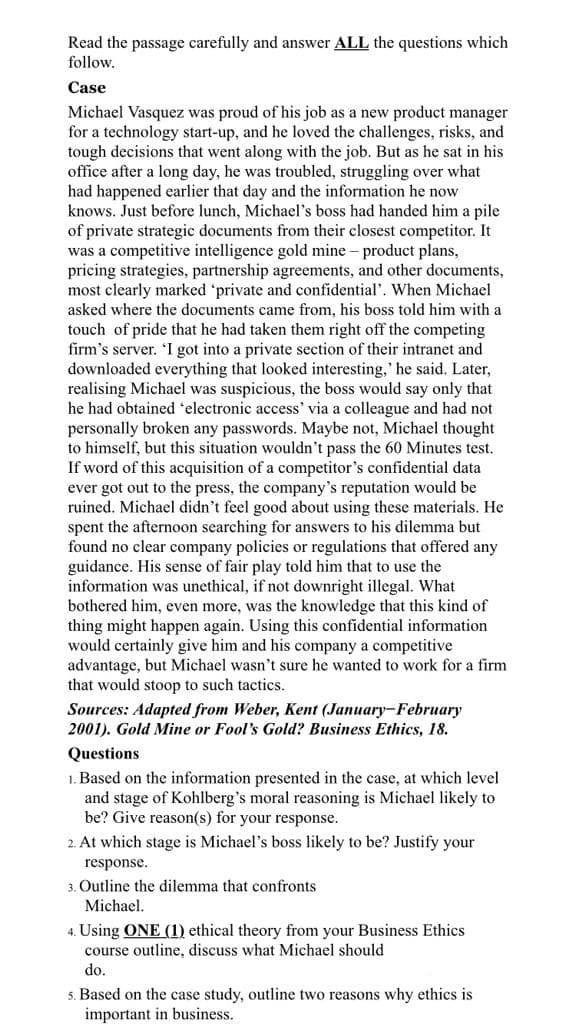1. Based on the information presented in the case, at which level and stage of Kohlberg's moral reasoning is Michael likely to be? Give reason(s) for your response. 2. At which stage is Michael's boss likely to be? Justify your response. 3. Outline the dilemma that confronts Michael.
1. Based on the information presented in the case, at which level and stage of Kohlberg's moral reasoning is Michael likely to be? Give reason(s) for your response. 2. At which stage is Michael's boss likely to be? Justify your response. 3. Outline the dilemma that confronts Michael.
Management, Loose-Leaf Version
13th Edition
ISBN:9781305969308
Author:Richard L. Daft
Publisher:Richard L. Daft
Chapter9: Managerial Decision Making
Section: Chapter Questions
Problem 1ED
Related questions
Question
Please answer all questions accordingly, 1 to 5. This Case Study is under the topic

Transcribed Image Text:Read the passage carefully and answer ALL the questions which
follow.
Case
Michael Vasquez was proud of his job as a new product manager
for a technology start-up, and he loved the challenges, risks, and
tough decisions that went along with the job. But as he sat in his
office after a long day, he was troubled, struggling over what
had happened earlier that day and the information he now
knows. Just before lunch, Michael's boss had handed him a pile.
of private strategic documents from their closest competitor. It
was a competitive intelligence gold mine - product plans,
pricing strategies, partnership agreements, and other documents,
most clearly marked 'private and confidential'. When Michael
asked where the documents came from, his boss told him with a
touch of pride that he had taken them right off the competing
firm's server. 'I got into a private section of their intranet and
downloaded everything that looked interesting,' he said. Later,
realising Michael was suspicious, the boss would say only that
he had obtained 'electronic access' via a colleague and had not
personally broken any passwords. Maybe not, Michael thought
to himself, but this situation wouldn't pass the 60 Minutes test.
If word of this acquisition of a competitor's confidential data
ever got out to the press, the company's reputation would be
ruined. Michael didn't feel good about using these materials. He
spent the afternoon searching for answers to his dilemma but
found no clear company policies or regulations that offered any
guidance. His sense of fair play told him that to use the
information was unethical, if not downright illegal. What
bothered him, even more, was the knowledge that this kind of
thing might happen again. Using this confidential information
would certainly give him and his company a competitive
advantage, but Michael wasn't sure he wanted to work for a firm
that would stoop to such tactics.
Sources: Adapted from Weber, Kent (January February
2001). Gold Mine or Fool's Gold? Business Ethics, 18.
Questions
1. Based on the information presented in the case, at which level
and stage of Kohlberg's moral reasoning is Michael likely to
be? Give reason(s) for your response.
2. At which stage is Michael's boss likely to be? Justify your
response.
3. Outline the dilemma that confronts
Michael.
4. Using ONE (1) ethical theory from your Business Ethics
course outline, discuss what Michael should
do.
5. Based on the case study, outline two reasons why ethics is
important in business.
Expert Solution
This question has been solved!
Explore an expertly crafted, step-by-step solution for a thorough understanding of key concepts.
This is a popular solution!
Trending now
This is a popular solution!
Step by step
Solved in 5 steps

Recommended textbooks for you

Management, Loose-Leaf Version
Management
ISBN:
9781305969308
Author:
Richard L. Daft
Publisher:
South-Western College Pub

Management, Loose-Leaf Version
Management
ISBN:
9781305969308
Author:
Richard L. Daft
Publisher:
South-Western College Pub